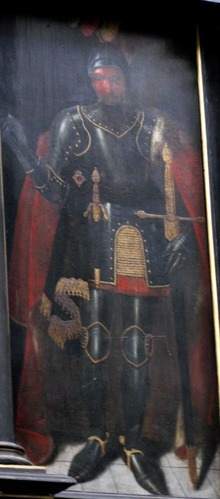Swantopolk II, Duke of Pomerania
| Swietopelk II | |
|---|---|
| Duke of Pomerania | |

17th century painting by Herman Han, Oliwa Abbey
|
|
| Spouse(s) | Eufrozyna of Greater Poland Ermengard of Schwerin |
| Noble family | Samborides |
| Father | Mestwin I, Duke of Pomerania |
| Mother | Swinisława |
| Born | c. 1195 |
| Died | 11 January 1266 |
| Buried | Oliwa Abbey |
Swietopelk II, also Zwantepolc II or Swantopolk II, (1190/1200 – 11 January 1266), sometimes known as the Great (Polish: Świętopełk II Wielki; Kashubian: Swiãtopôłk II Wiôldżi), was ruling Duke of Pomerelia-Gdańsk from 1215 until his death. He was the first member of the Samborides to style himself dux from 1227 onwards.
The duke is known under many spellings (Swantepolk, Swantipolk, Svatopluk, Swietopelk, Swatopolk, Sviatopolk, Światopełek, Świętopełk, Swiãtopôłk), of which Domin(us) Zwantepolc(us) D(ux) Danceke and Svantopelc Ducis Pomeranie were used on seals.
Swietopelk was the son of the Pomeranian duke Mestwin I and his wife Swinisława. His father had ruled over Eastern Pomerania (or Pomerelia) since about 1205 by appointment of the Polish high duke Władysław III Spindleshanks. In 1216 or 1217 his son Swietopelk was made a steward over Pomerelia by High Duke Leszek I the White of Kraków. He was responsible for the Gdańsk territory, the largest of the four portions of Pomerelia. In 1218, Swietopelk took advantage of a revolt of local knights against Danish rule to occupy the Lands of Schlawe and Stolp. After his brother Warcislaw died without heirs, Swietopelk took over his Lubiszewo Tczewskie.
Upon their father's death, Swietopelk's brothers Sambor and Racibor were still young, so he acted as their guardian. As they came of age, the brothers received their share of inheritance: Sambor received Lubiszewo Tczewskie and Racibor received Białogard.
...
Wikipedia
